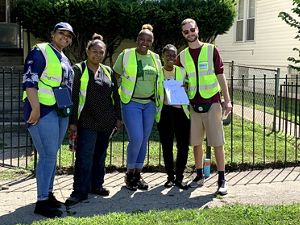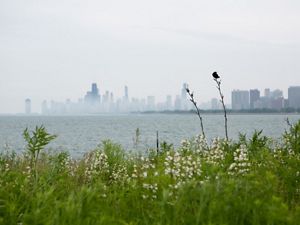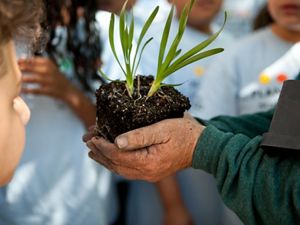Chicago is the third most populated city in the United States and is home to culturally rich neighborhoods steeped in vibrancy and innovation. It’s also home to some of the most biodiverse plants and animals in Illinois. Just as climate change is impacting coastal cities, its effects are also felt here, and can be expected to exacerbate existing stressors and health disparities—likely with worse impacts in low-income communities and Black, Latine, and other communities of color. Community-led solutions that nurture connections to nature and support the health and well-being of people are more important than ever.
From urban farming and caring for community parks to training and supporting youth, volunteers and staff, Black community members and leaders across Chicago are making real change on the ground by creating multifaceted solutions rooted in the experiences of neighbors to encourage everyone to advocate for a healthier, greener city. Meet six of these individuals, hear how they’re shaping the future and what advice they have for the next generation of leaders.
Quote: Ajiah Gilbert

I didn’t see a lot of other Black people wanting to pursue the same thing as me. It was finding out that I could not only have multiple passions but that I could also combine them, that helped me find a career I am truly happy in.
Ajiah Gilbert
When Lyajiah (Ajiah) Gilbert first headed to college, she had plans of becoming a marine biologist. But the courses she enrolled in at the University of San Diego took her down an entirely different path.
“In my freshman year, I started to study ethnic studies alongside my biology degree, which helped me realize the connection between ecology and race,” she explains. “I did my senior year thesis on how community gardens in Black communities are actions of resistance by creating food sovereignty in the face of societal oppression.”
After graduating, Ajiah become a Peace Corps youth counselor, where she found a passion for community organizing and education. She paired that interest with her environmental background and led the Imani Green Health Advocates Program from 2021 to 2023, training youth in the South Side of Chicago in urban forestry and community health. She continues to pursue this passion today as a Community Centered Conservation Program Manager at Land Trust Alliance. She credits her mother with nurturing her own love of nature and environmental causes.
“My mom has always been the reason I do everything. Growing up, we couldn't do a lot of the activities my peers did, like camping or hiking trips, just due to time and finances,” she says. “But my mom always made sure I had some sort of outlet for those passions. She signed me up for Girl Scouts, where I went camping a few times a year. She took me to The Museum of Science and Industry whenever she could because she knew how much I loved science. She watched Shark Week with me every year and listened to me drone on and on telling her cool fish facts. She fought for me to experience as much as I possibly could, even if it meant she had to make sacrifices of her own.”
Even with her mother’s support, entering the world of conservation wasn’t easy.
“A challenge I faced, until recently, is how little I saw myself in the conservation community. Even though I’ve always loved biology and science, I was usually one of the only Black people in my courses,” she says. “It wasn’t until I began studying ethnic studies that I started to see more Black community members discussing conservation. I think that being a Black woman has given me a unique opportunity to enter into these communities and hold these discussions since we have our background and race in common.”
Now, she advises the next generation to keep an open mind about a wide variety of conservation careers.
“Don’t limit yourself in what you want to pursue. As I said, I planned on being a marine biologist when I graduated high school. And there were a lot of moments I felt discouraged because I didn’t see a lot of other Black people wanting to pursue the same thing. It was finding out that I could not only have multiple passions but that I could also combine them, that helped me find a career I am truly happy in.”
Quote: Carol Johnson
For my culture, there is a lot of injustice and things that have happened over time. That inspires me to teach the next generation as well. They empower me, because I’m not doing this for me, I’m doing it for them.
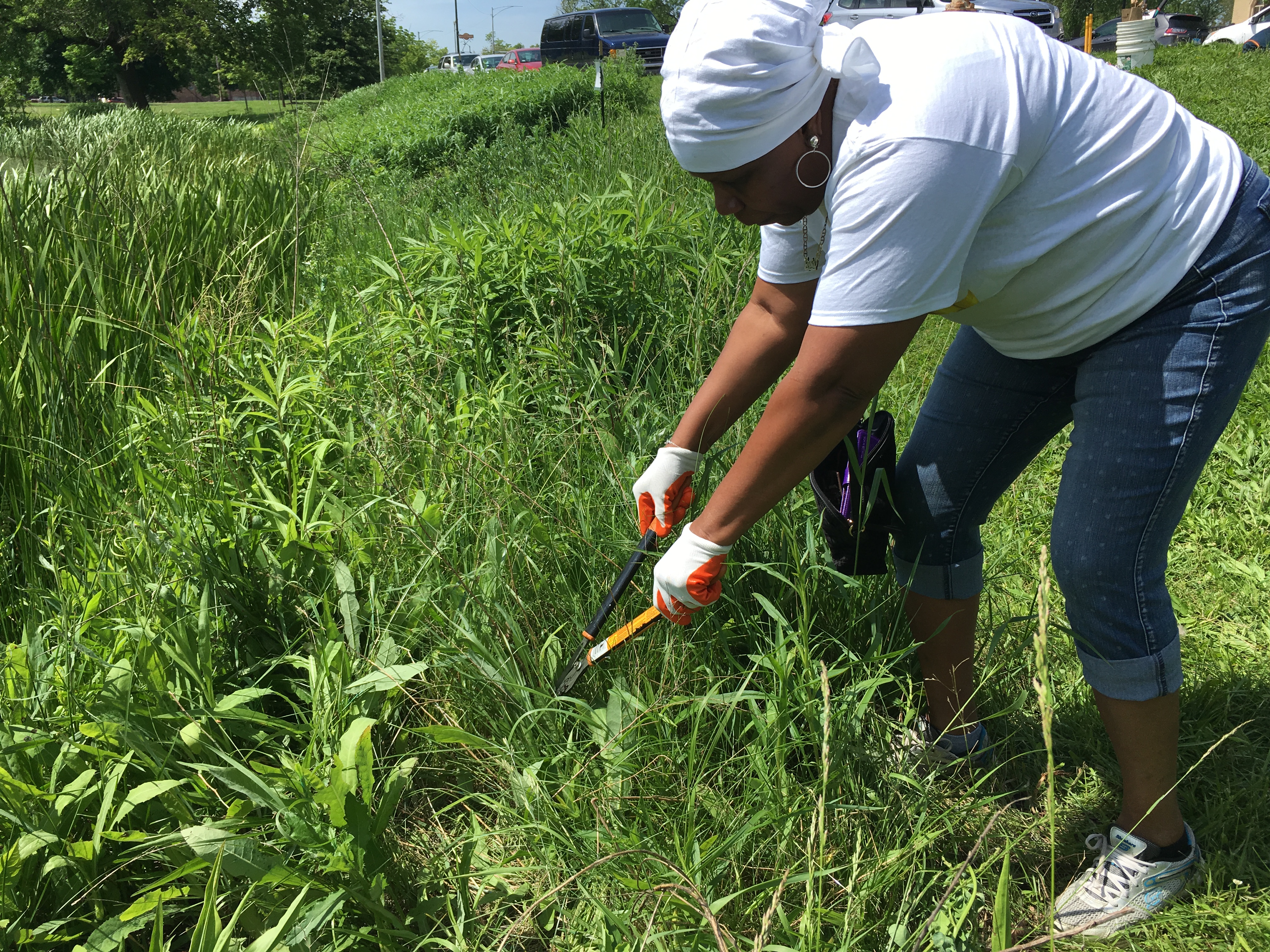
Carol Johnson
As a mother, wife, community organizer, native Chicagoan and long-time resident of Chicago's West side, Carol G. Johnson "Ms. J" has always worked to connect people to the power of nature.
“When they were growing up, I took my children camping and to places like Touch of Nature in southern Illinois, because I knew how important that was,” she says. “I did the same for the youth in our community programs, because I’ve always had that interest in helping urban kids get out of their surroundings.”
Today, Ms. J continues this work at Garfield Park, where she brings people together to care for the park’s natural area as a volunteer Community Steward. Her role at the park has evolved over time.
“Initially I was serving on the Garfield Park Advisory Council because I wanted to bring people back to the Park,” she recalls. “At one of our meetings, I was asking about the invasive species and weeds I was seeing in the natural area. The President introduced me to the stewardship program and the next thing I knew, I was recruited as the site steward.”
In this role, Ms. J is focused on restoring the habitat and making it accessible to those in the neighborhood.
“I want us to take care of our communities and our park, and unfortunately, Garfield Park has had a negative image for some time,” she says. “First, we had to make it safe, and then we had to make it beautiful, because we want to bring people back to it.”
To do that, Ms. J has designed nature walks, tree walks and a tree guide to help community members learn more about the natural area. In doing so, it’s also helped her get more in touch with nature on a personal level.
“It’s so important for us to protect the environment,” she says. “As an African American, a lot of times the youth in our community might not know their history, and how our ancestors in the south were so in tune with nature.”
“For my culture, there is a lot of injustice and things that have happened over time,” she says. “That motivates me to educate African Americans, and inspires me to teach the next generation as well. They empower me, because I’m not doing this for me, I’m doing it for them."
Today, she is excited to share the nature that is thriving at Garfield Park with others in the neighborhood and across the city.
“Come to our park; there’s so much to see,” she says. “In the natural area, there are so many species of birds that visit. Once you enter it, you can let the sounds of the city fall away and just listen.”

Help Us Connect More People to Nature
Sign up to receive monthly conservation news and updates from Illinois.
Quote: Isaiah Ballinger
In terms of inspiration, it’s the people who are coming up in this field that drive me. I can see their passion, and I can see them fighting to shape the world the way they think it should be, rather than accepting the way it is.
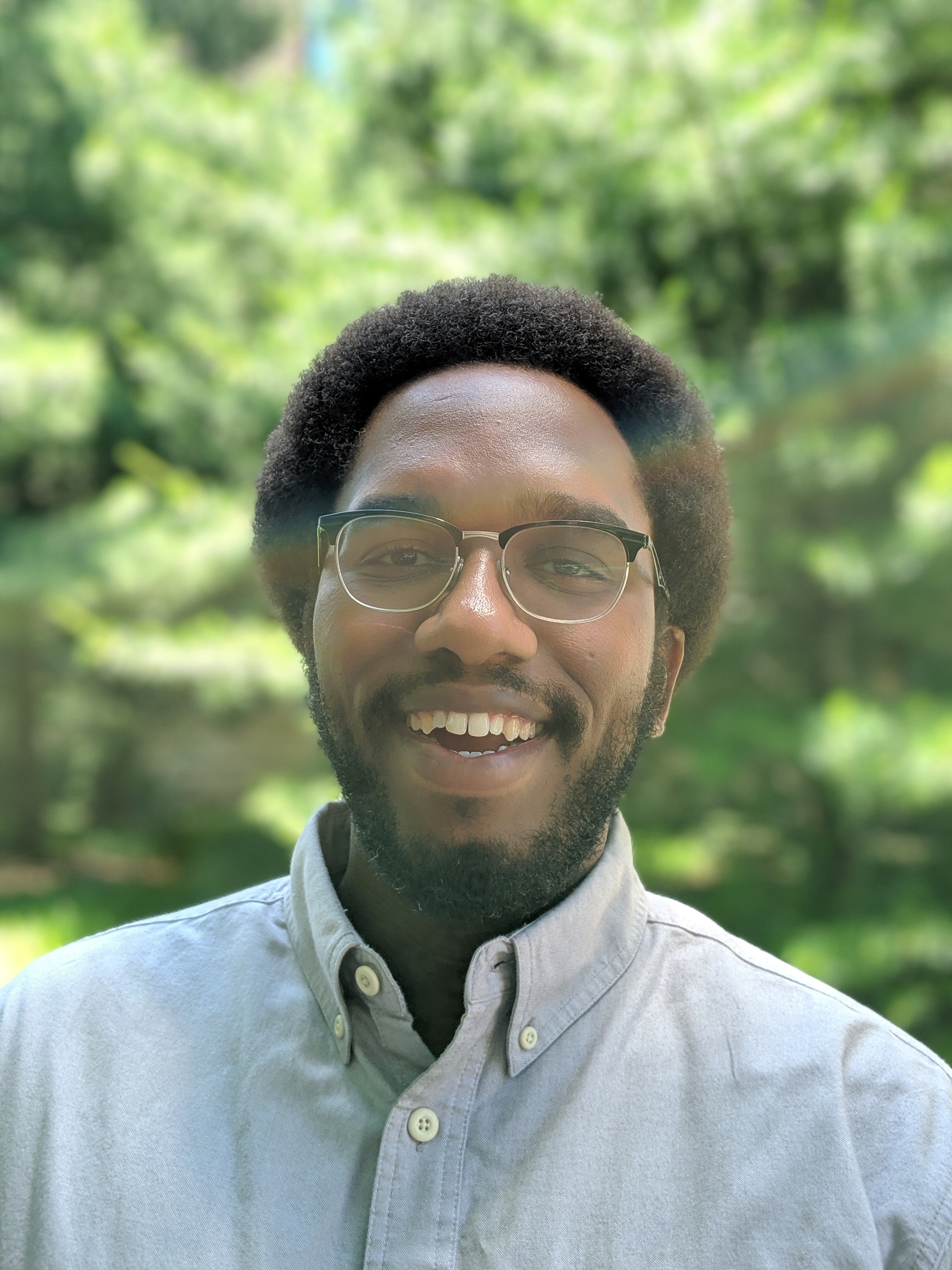
Isaiah Ballinger
When he’s not riding his bike or searching for morel mushrooms (which he never finds), Isaiah Ballinger is the Natural Areas Manager for the Chicago Park District. Through this role, he supports and manages staff in restoring, enhancing and expanding natural areas throughout the city while connecting communities to nature in woodlands, prairies and marshes in city parks. It is those connections that motivate him in this work.
“In terms of inspiration, it’s the people who are coming up in this field that drive me,” he says. “I can see their passion, and I can see them fighting to shape the world the way they think it should be, rather than accepting the way it is.”
Isaiah knows a thing or two about challenging the status quo, and confronting challenges to make much-need social and environmental changes.
“I wouldn’t be here if I didn’t like this field, but looking back I remember some of the challenges of getting started. Favoritism, nepotism, sexism, homophobia or racism constantly shaped my workday,” he explains. “This makes my current position challenging yet rewarding. I want other people to have a better work environment than I did. I want to be more inclusive. I want to provide and receive feedback, be empathetic, and provide a sense of mentorship. I don’t want anyone to be left out of the conversation; I want to bring them in. I’m going to get it wrong sometimes too. But I will work and work to get to it right.”
He encourages the next generation to follow their own hearts and instincts to usher in the changes the world needs.
“Don’t rely on advice from us old people,” he advises. “The advice given to me by the previous generation has always been, ‘you can’t get a job with an afro,’ ‘you have to look professional,’ or ‘you gotta speak like this.’ A lot of the advice has boiled down to ‘conform if you want to succeed.’ Things stagnate when we play by the rules. I’ve seen the next generation, and I‘m excited. Trust yourself. Don’t let us hold you back.”
Quote: Princess Harris

Michael Howard and Veronica Kyle both gave me a chance, but beyond that, they made me realize there are people who look like me that have been doing this work. I wouldn’t be here if it weren’t for them.
Princess Harris
Princess Harris, Sustainable Food & Land Use Coordinator for Faith in Place, always wanted to be an environmentalist. She traces that passion to a childhood growing up near Marian R. Byrnes Park, which has one of Chicago’s largest natural areas.
“My Mom would let me go out to the natural area every day, and that fueled my curiosity about the environment,” she recalls. “I started to ask so many questions: about what happens to our trash, about what happens to the food in the grocery store we don’t eat.”
But despite that passion and curiosity, she initially thought medicine was in her future.
“It hasn’t always been easy,” she says. “Growing up in an African American home meant that considering an environmental career made me an outlier in my family. So I went to school and was trying to be a doctor. And I was bored out of my mind.”
Until one day, Princess took an elective class on environmental studies that changed everything.
“It was the hardest class I had,” she recalls. “We went to Belize to study the rainforest and after spending a week there, I knew this is what I needed to be doing.”
She graduated with her degree in environmental science just as the Great Recession of 2007 began, which made starting her job search difficult. Being a Black candidate applying at conservation organizations that are predominately white, she faced other obstacles as well.
“During the interview process, I was often asked to come back and do more: write additional essays, put together additional Powerpoint presentations,” she explains. “The challenges weren’t only that I wasn’t being given a chance, but that I was being asked to do more and then still not being given a chance.”
Princess became a youth mentor in Englewood, where she worked with young people to address the myriad issues they were facing, as well as help them learn about the environment. Later, a chance encounter with a neighbor brought her back to a career in conservation.
“I was walking my dog one day and I met another lady who had a yorkie,” she says. “She invited me over for tea and through our friendship, I eventually met Michael Howard of Eden Place. I started volunteering and eventually I began working with him on urban farming.”
Later, Princess learned about an open position with Faith in Place. She met with Veronica Kyle during the interview process, and not only found the role she’s currently in, but another mentor and source of inspiration.
“Michael Howard and Veronica Kyle both gave me a chance, but beyond that, they made me realize there are people who look like me that have been doing this work,” she says. “I wouldn’t be here if it weren’t for them.”
Quote: Michael Howard
A lot of our young folks are walking around with no hope. That’s a pandemic in and of itself, so for us, instilling hope is one of the most important things we do.
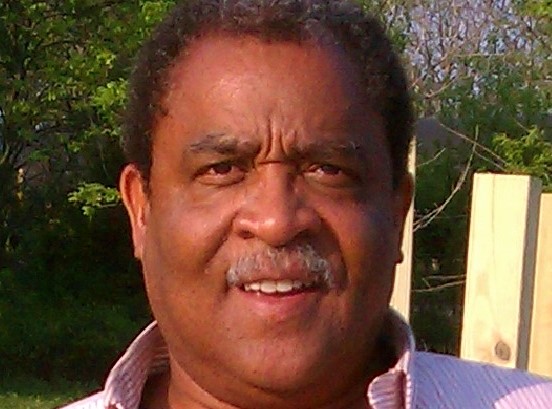
Michael Howard
It was 1997 when Michael Howard learned that his neighborhood, Fuller Park, contained the highest lead levels in the City of Chicago. A long-time community leader, he decided to take action. He bought an illegal dumpsite located across from his home, cleaned it up with the help of volunteers and community members, and paved the way for what is today Eden Place Nature Center. This is just one of many community programs Mr. Howard has led over the past 30 years.
“I’ve always been a very self-motivated person, and I’ve always been a community conscious person, ever since my youth,” he says. “I spent a lot of time with my elders, and I did a lot of listening to them. That’s my influence. I’ve had a lot of opportunities to learn a lot of different things, and I’ve been able to use my past experiences in my work today and try to transfer that skill set to others.”
The suite of programs Mr. Howard has created holistically address community needs, from educational programs, to the Leaders in Training program for local teens, to job training.
“The longest program I ran was my job training program, which taught construction skills to people in need of a second chance,” he says. “In total, we helped more than 3,000 people gain basic construction skills to turn their life around. Now, I see past and former students on Facebook or in Home Depot because they are running their own companies, raising their own kids and hiring other people from the community. That’s what it’s all about.”
Mr. Howard also saw the need for a program focused on food and urban farming. From there, he began to teach classes on raised bed gardening.
“A lot of our clients had issues with food security, because we don’t have a grocery store close by,” he says. “At our at our learning center, we teach people how to grow their own food in raised beds. We also focus on environmental justice issues.”
Through programs like these, Eden Place has led the way for both people and nature, even in the face of challenges.
“As a Black organization, one of the obstacles we have to overcome is access to capital, and that it’s not an even playing field,” he says. “But even though we don’t have that same access, we have been able to affect change in many people, giving people the skills they need to feed themselves, the rest of their families, and even hire other community members in the future.”
One of the things that keep Mr. Howard and his wife motivated and moving forward is hope.
“We teach the young folks to look to themselves to make the change, and one of the things we do is instill a lot of hope,” he says. “Almost 30 years ago, I was teaching a class to some high school students, and I asked them where they want to be when they are 25. The main answer I got was: ‘Mr. Howard,’ we just want to be alive.’”
“In that moment, the realization hit me that a lot of our young folks are walking around with no hope. That’s a pandemic in and of itself, so for us, instilling hope is one of the most important things we do.”
Quote: Wanda Neely
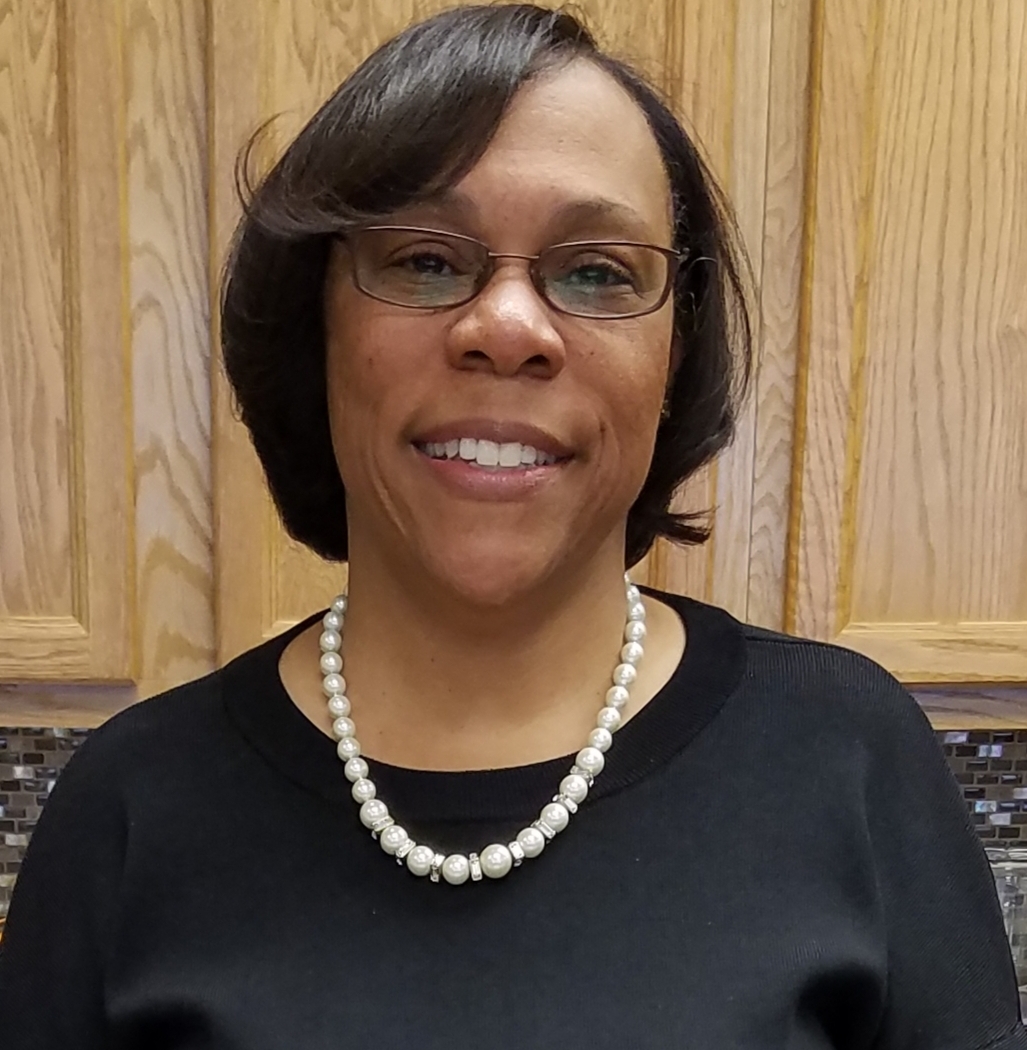
I stand on the shoulders of many people of color whose sacrifices made it possible for me to sit where I sit today. As such, it is my responsibility to teach, reach and provide opportunities to as many people as I can.
Wanda Neely
Wanda Neely is a native of the Great Lakes State (Michigan) where she grew up visiting State Parks with her family most weekends. When she first joined The Nature Conservancy as the Human Resources Manager for the Illinois chapter, she relocated to the greater Chicagoland area five years ago and is enjoying life in the Windy City. She is now the Midwest HR Business Partner for The Nature Conservancy.
Wanda has over 20 years of professional Human Resources experience and likes to refer to herself as being in the “People Business.” What she enjoys most about HR is recruiting, engaging with the community, and helping others to develop professionally. In 2020, Wanda co-founded an affinity space called “This is We” for Black, Indigenous, and other people of color working for The Nature Conservancy across five states in the Midwest.
“One of my sources of inspiration is the Civil Rights Movement,” she says. “So many sacrificed their time, talents, and even their lives for equal rights. I stand on the shoulders of many people of color whose sacrifices made it possible for me to sit where I sit today. As such, it is my responsibility to teach, reach, and provide opportunities to as many people as I can. I live by the adage ‘To whom much is given, much is required.’”
The challenges of working in conservation as a HR Professional and recruiter come with identifying people of color to source as candidates.
“Conservation remains a white male dominated field, and as such, I am grateful to have connected with organizations such as Environmentalists of Color, Blacks in Green, and Green the Church,” Wanda says.
For the young people who are interested in working in community engagement or conservation, Wanda has a checklist:
- Follow your passion
- Understand that you cannot take everyone on your journey
- Align yourself with likeminded individuals
- Stand strong when you are the only person of the color in the room
- Don’t dim your light because others cannot handle your shine
